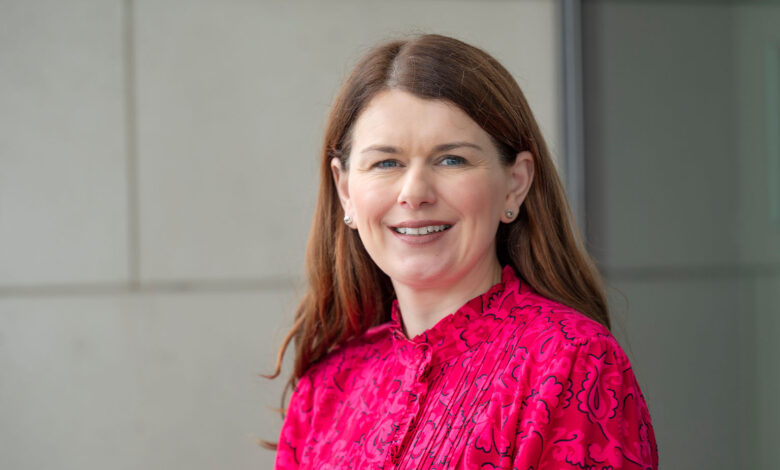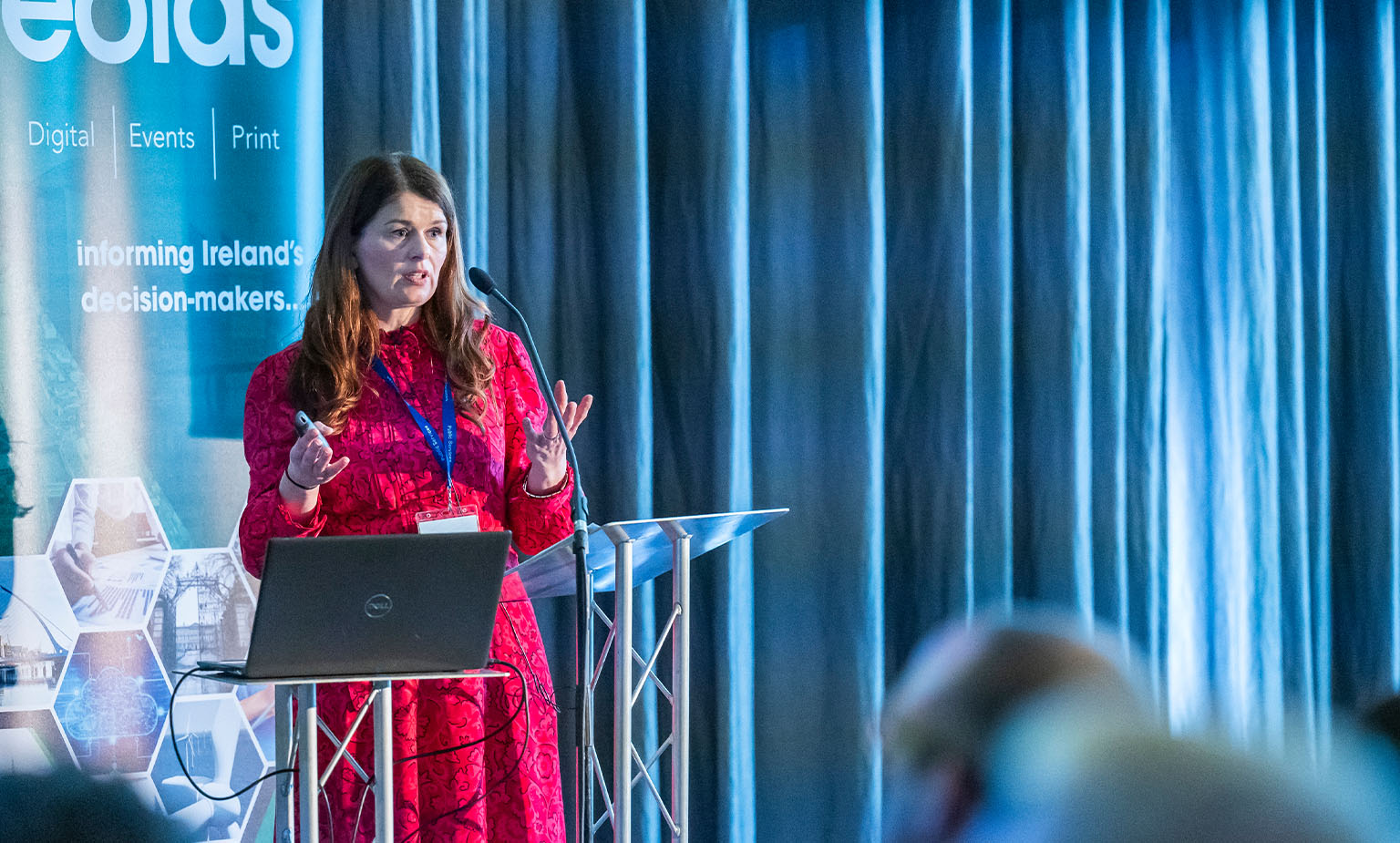Transforming Irish policing

Speaking to eolas Magazine following her recent contribution to the Public Services 2024 Conference, Executive Director for Strategy and Transformation at An Garda Síochána, Eimear Bourke, highlights how service transformation is crucial in providing a better policing service to the communities and the people of Ireland.
Bourke outlines that An Garda Síochána has undergone a period of significant transformation to its services, structures and ways of working in recent years. The underlining principle of this process, she says, has been the need to prioritise and support frontline gardaí in delivering effective services in communities. Given the inherent unpredictability of policing demand, Bourke says that delivering and realising the benefits of change within An Garda Síochána “means we need to apply two lenses; operational flexibility and long-term improvement”.
With over 17,000 personnel, including 14,000 gardaí, An Garda Síochána operates an extensive network of approximately 560 stations, supported by a €2.3 billion budget. “What makes us unique from other policing agencies is that we cover both policing and national security,” the Executive Director for Strategy and Transformation observes.
The transformation journey over the past five years, driven by the A Policing Service for the Future implementation plan, has focused on supporting frontline service through new operating structures, leveraging new technology, enhancing governance, and fostering specialised supports. This includes: shifting from a district to a divisional model; increased focus on community policing; and having centralised business services supports in every Garda division.
“Greater accountability around what we do and the decisions that we make is important to communities and people having trust in what we do,” Bourke indicates.
And as noted in the latest Garda Public Attitudes Survey of 2022, there is a high level of public trust in An Garda Síochána with 90 per cent of those surveyed viewing the organisation as fair and respectful. That trust, Bourke emphasises, is critical in shaping strategies.
“Public perception feeds into our three-year strategy and planning, but also it helps us in terms of how we allocate resources and decisions that we make on an operational basis,” she says.
In shaping strategy Bourke reflects on Ireland’s changing context, which is marked by global challenges such as climate change, migration, and cyber-enabled crime, outlines the importance of a collaborative approach. In this context, she notes An Garda Síochána works closely with government departments and community organisations to collaboratively tackle issues ranging from road safety to crime.
“We need to be sophisticated, leverage technologies and upskill our people to tackle the changing natures of crime.”
Eimear Bourke, Executive Director for Strategy and Transformation, An Garda Síochána
“The nature of crime is consistently changing. The definition of crime 20 years ago is very different to today, with economic and cyber related crime cited as examples where An Garda Síochána have adapted and grown specialist skills and capabilities to prevent and investigate such crime types.
“Technological advancements have also been pivotal. Alongside An Garda Síochána’s transformation programme, the ongoing delivery of a data and technology vision has seen significant investments in IT and data architecture, supporting enhanced information-led approaches to policing,” she says.
Under the active mobility programme, for example, every Garda member now has a mobile device equipped with custom policing apps that allow them to spend less time in stations, and more time working in communities.
These devices are proactively assisting gardaí in detecting crime while on frontline duties, for instance a new system now allows members of An Garda Síochána to quickly and easily identify uninsured vehicles while on the roadside by checking its registration on a Garda Mobility App.
Furthermore, the launch of a proof of concept for body worn cameras, and the supporting Digital Evidence Management System (DEMS), at stations in Dublin and Limerick city marks another step forward for An Garda Síochána towards the implementation of information-led policing.
There are now four stations and 500 trained gardaí using body worn cameras. Their benefits are already being seen with feedback suggesting they have directly led to the de-escalation of situations which might ordinarily escalate.
The ability of An Garda Síochána to securely acquire and process digital evidence is a key feature of modern policing. And the use of body worn cameras, supported by the underlying legislation, technology and training, acts as an important evidentiary tool.
Bourke highlights that further advances have been made in service delivery following the introduction of the GardaSAFE computer aided dispatch system. This has seen a significant upgrade in emergency response and dispatch technology, managed through four new regional command and control centres.
“This means that we can make real-time decisions on how we prioritise calls, how we allocate resources, making sure that resources are sent to a particular call, and they have got the right skills and right equipment. Therefore, it means that when a garda goes to a particular call, they have all the information they need,” Bourke underlines.
Beyond this she also highlights the importance of adapting and expanding the skillsets and expertise of personnel within An Garda Síochána.
The Executive Director for Strategy and Transformation outlines the importance of investing in people. One of the key benefits of An Garda Síochána’s new divisional operating model, she says, is that it has allowed the redeployment of gardaí from administrative to policing roles. This has been supported by a significant increase in the size and skill profile of An Garda Síochána’s civilian workforce.
However, in a competitive recruitment landscape, Bourke says that An Garda Síochána recognises the need to balance new recruitment with the retention and career development of its existing workforce, who possess extensive organisational knowledge and experience.
Significant changes have been made in personnel development, she outlined. With over 740 new Garda trainees and 530 new civilian staff joining in 2023, the focus has also been on health and wellbeing, mental health training, and in particular human rights education.
She outlines that in recent years, An Garda Síochána has put a significant emphasis on our role as the first line of defence of the human rights of all people we come into contact with.
“Human rights are central to every decision we make,” reflects Bourke, highlighting the integration of ethical considerations in policing through the Garda Code of Ethics.
She adds that the Garda Code of Ethics clearly states that policing must be carried out in a manner that is independent and impartial, that respects human rights, and that supports the proper and effective administration of justice.

“Human rights are central to every decision we make.”
As part of a range of measures to embed human rights, An Garda Síochána, in conjunction with the University of Limerick, has introduced a human rights and policing course that has been undertaken by more than 3,000 Garda personnel (*correct as of June 2024) with 1,000 more to take it in 2024.
Policing colleagues from the Federal Bureau of Investigation (FBI), the Drug Enforcement Administration (DEA), the United States Department of Homeland Security, the Belgian Federal Police, and the Tanzanian Police Force have also undertaken the course.
Summarising, Bourke asserts that An Garda Síochána’s mission of keeping people safe is “more relevant than ever in a rapidly changing Ireland”.
“We need to be sophisticated, leverage technologies and upskill our people to tackle the changing natures of crime. We are going to continue to focus on supporting our people by focusing on their professional development, along with their health and wellbeing. This is a huge opportunity, and it is exciting to see the impact of what that means. We want all of this to have a significant, positive impact on our all our people”.
“The ongoing commitment to community engagement, ethical policing and supporting our people will ensure that An Garda Síochána remains a trusted and effective policing service dedicated to serving communities and the people of Ireland,” she concludes.





